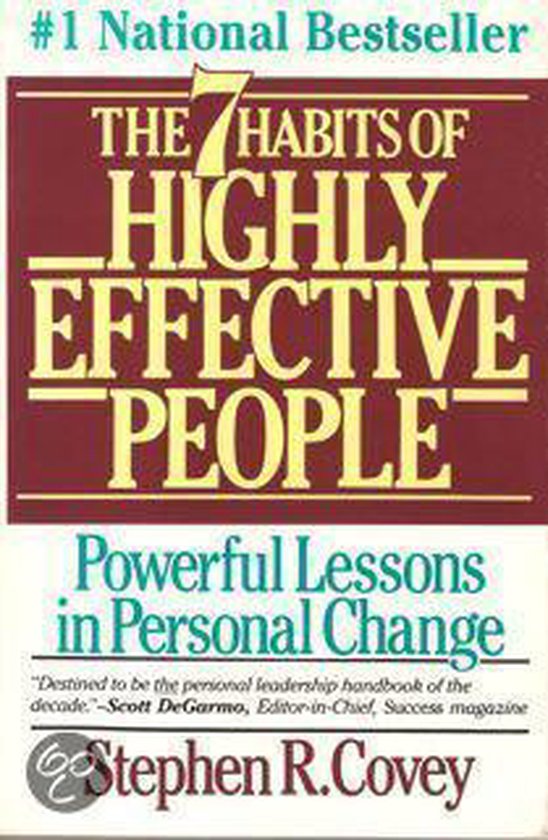The 7 habits of highly effective people

Uiterlijk 5 december in huis
There is no real excellence in all this world which can be separated from right living.
DAVID STARR JORDAN
MORE THAN 25 YEARS of working with people in business, university, and marriage and family settings, I have come in contact with many individuals who have achieved an incredible degree of outward success, but have found themselves struggling with an inner hunger, a deep need for personal congruency and effectiveness and for healthy, growing relationships with other people.
I suspect some of the problems they have shared with me may be familiar to you.
I've set and met my career goals and I'm having tremendous professional success. But it's cost me my personal and family life. 1 don't know my wife and children any more. I'm not even sure I know myself and what's really important to me. I've had to ask myself —is it worth it?
I've started a new diet—for the fifth time this year. I know I'm overweight, and 1 really want to change. 1 read all the new information, 1 set goals, I get myself all psyched up with a positive mental attitude and tell myself 1 can do it. But 1 don’t. After a few weeks, 1 fizzle. 1 just can't seem to keep a promise 1 make to myself.
ve taken course after course on effective management training. l expect a lot out of my employees and 1 work hard to be friendly toward them and to treat them right. But 1 don't feel any loyalty from them. I think if 1 were home sick for a day, they'd spend most of their time gabbing at the water fountain. Why can't 1 train them to be independent and responsible—or find employees who can be?
My teenage son is rebellious and on drugs. No matter what Ì try, he won't listen to me. What can 1 do?
There's so much to do. And there's never enough time. 1 feel pres ur hassled all day, every day, seven days a week. I've attended } management seminars and I've tried half a dozen different p systems. They've helped some, but I still don’t feel I'm living the ha productive, peaceful life 1 want to live.
l want to teach my children the value of work. But to get them to anything, have to supervise every move . . . and put up with complain every step of the way. It's so much easier to do it myself. Why ca children do their work cheerfully and without being reminded?
I'm busy—really busy. But sometimes 1 wonder if what I'm doing wa make any difference in the long run. I'd really like to think there wa meaning in my life, that somehow things were different because Ì was here I see my friends or relatives achieve some degree of success or receive some recognition, and 1 smile and congratulate them enthusiastically. But inside, I'm eating my heart out. Why do 1 feel this way?
l have a forceful personality. I know, in almost any interaction, 1 can control the outcome. Most of the time, 1 can even do it by influenaing others to come up with the solution 1 want. I think through each situation and Ì really feel the ideas 1 come up with are usually the best for everyone. But I feel uneasy. l always wonder what other people really think of me and my ideas.
My marriage has gone flat. We don’t fight or anything; we just don't love each other anymore. We've gone to counseling; we've tried a number d things, but we just can't seem to rekindle the feeling we used to have.
These are deep problems, painful problems—problems tha quick fix approaches can’t solve.
A few years ago, my wife Sandra and I were struggling with thi kind of concern. One of our sons was having a very difficult tim in school. He was doing poorly academically; he didn't even knor how to follow the instructions on the tests, let alone do well o them. Socially he was immature, often embarrassing those close! to him. Athletically, he was small, skinny, and uncoordinated.
- 1 Bekijk alle specificaties



Taal: en
Bindwijze: Paperback
Aantal pagina's: 360
Kaarten inbegrepen: Nee
Illustraties: Nee
Hoofdauteur: Stephen Covey
Tweede Auteur: Sean Covey
Originele titel: The 7 Habits of Highly Effective People (Miniature Editions) (RP Minis
AI-gegenereerd: Nee
Dyslexievriendelijk: Nee
Extra groot lettertype: Nee
Product breedte: 140 mm
Product hoogte: 23 mm
Product lengte: 218 mm
Studieboek: Nee
Verpakking breedte: 1 mm
Verpakking hoogte: 1 mm
Verpakking lengte: 1 mm
Verpakkingsgewicht: 398 g
eWaste: Nee
EAN: 9780671708634